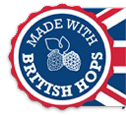This artwork is designed for use on your pump clips, labels and marketing materials. Then your customers will know your beer has been brewed with British Hops. A huge thanks to the many brewers already proudly supporting British hops.

The British Hop Association was formed by British Hop Growers in 1996 to ensure that the industry had a coordinated approach to its activities and in particular the research and development of new hop varieties through its subsidiary Wye Hops. In 1998 there were 13 commercially-grown British hop varieties, today there are 31. Given that it can take 10 years to develop a new hop variety, that’s quite an achievement.
The British Hop Association, formerly known as The National Hop Association, is a limited company, with three Directors from each of the 3 Growers Groups sitting on its Board. The Growers Groups are: English Hops Ltd, Faram Farms Ltd, Wealden Hops Ltd. The British Hop Association is the forum by which growers make representations to the UK Government, the EC, international & national industry committees.
British Hops ‘Terroir’:
All British hops share the same wonderful ‘terroir’ – great soils and a mild maritime climate with even rainfall throughout the year. We use the natural resources we have available, which means that very few of our hops are irrigated. It is this special and sustainable terroir that gives our hops a lower level of myrcene than hops grown anywhere else in the world. It is lower myrcene that makes the aromas so delicate and complex and so good at helping you to brew the best session beers in the world (in our humble opinion). To find out more about lower myrcene levels, click on British Hops USP Climate.
The facts about British Hops:
There are 34 commercially grown British Aroma Hop varieties in the UK.
This artwork is designed for use on your pump clips, labels and marketing materials. Then your customers will know your beer has been brewed with British Hops. A huge thanks to the many brewers already proudly supporting British hops.

Are you adding the great flavours of hops into your foods? This artwork is designed for use on your marketing materials. Then your customers will know your product has been made with British Hops

On farm trial, we also have some very exciting new varieties coming through that are hitting the high notes too, such as Archers, Minstrel and Endeavour.